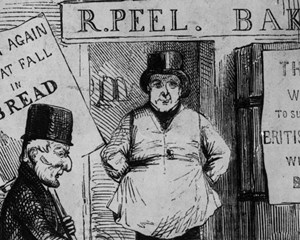(单词翻译:单击)
中英文本
Finance & economics
财经板块
Corn Laws scythed, 175 years on
《谷物法》被收割后,175年过去了
The appeal of Peel and repeal
皮尔的上诉和废除
What the end of Britain's Corn Laws in 1846 says about free trade today
1846年英国《谷物法》的废除对今天的自由贸易有什么启发
About half of most British people's income in the 1830s and 1840s was spent on food. Hunger was commonplace, occasionally sparking riots. Contributing to the high cost were tariffs on imported grain, called the Corn Laws, which soared as high as 80%. The system enriched aristocratic landowners when most Britons were not allowed to serve in Parliament or vote.
在19世纪30年代和40年代,大多数英国人大约有一半的收入花在食物上。饥饿是家常便饭,偶尔还会引发骚乱。对进口谷物征收的关税,也就是所谓的《谷物法》,导致了高昂的成本,关税飙升了80%。当大多数英国人不被允许在议会任职或投票时,这种制度使贵族地主们富裕起来。

Facing public anger, a famine in Ireland and fears of starvation in Britain, the prime minister, Robert Peel, introduced legislation to end the tariffs. On June 25th 1846 the House of Lords repealed the Corn Laws, following a House of Commons vote a month earlier. It marked a major moment in the history of open economies. How it was achieved offers lessons to those defending the global trading system today.
面对公众的愤怒、爱尔兰的饥荒和英国对饥饿的恐惧,总理罗伯特·皮尔提出了终止关税的立法。1846年6月25日上议院废除了《谷物法》,此前一个月下议院进行了投票。这是开放经济体历史上的一个重要时刻,它的实现方式为今天捍卫全球贸易体系的人提供了教训。
The first lesson is to organise a broad coalition and creatively use the media. It was not simply the poor who had an interest in lower grain prices. A new generation of prosperous manufacturers and moralminded aristocrats joined forces. They established what might be one of the first lobbying groups, the Anti-Corn Law League, which hosted rallies, financed research and supported political candidates. Books and pamphlets sprang up to make the case. The Economist itself was founded in 1843 to campaign for the abolition of the Corn Laws and for free trade.
第一个教训是,组织广泛的联盟,创造性地利用媒体。不仅是穷人对较低的粮食价格感兴趣,新一代繁荣的制造商和有道德的贵族也联合到了一起。他们建立了反谷物法联盟,这可能是最早的游说团体之一。该联盟主办集会,资助研究,并支持政治候选人,书籍和小册子也纷纷涌现。《经济学人》本身成立于1843年,其宗旨是为废除《谷物法》和自由贸易而战。
译文由可可原创,仅供学习交流使用,未经许可请勿转载。
词语解释
1.join forces 协力
First, the two countries should join forces to prevent a protracted global recession.
第一,两国应当携起手来,防止出现旷日持久的全球衰退。
2.spring up 涌现
In the immediate aftermath of the riots, a mood of hope and reconciliation sprang up.
暴乱之后紧接的是一股希望与和解情绪的产生。


